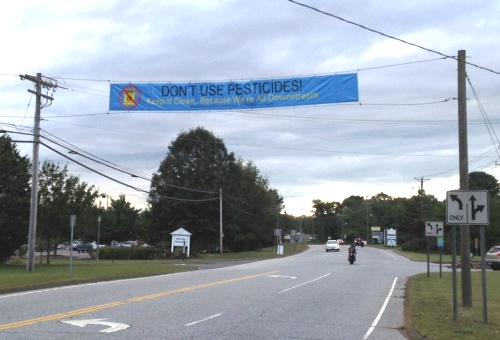
Coinciding coincidentally, with the DEEP sprayings of glyphosate on the phragmites in several locations in Old Lyme, the Old Lyme Conservation Commission’s banner (pictured above), which has been in the works for some time and its placement over Halls Road scheduled months ago, is displayed to bring awareness to reduce the use of pesticides in Old Lyme. The banner’s debut coincides with the 50th Anniversary of Rachel Carson’s Silent Spring, which is this September.
Orion publication gave this insightful look into Rachel Carson in their September issue: “Rachel Carson, the ecologist who kicked the hornet’s nest, wrote a book that needed no subtitle. Silent Spring rocketed to the top of the bestseller list, prompted a meeting with the president’s science advisers, occasioned congressional hearings, and circled her neck with medals of honor. It also let loose swarms of invective from the pesticide industry.”
The Orion article continues, “Carson hid her battle with cancer out of fear that her enemies in industry would use her medical situation to attack her scientific objectivity and, most especially, her carefully constructed argument about the role that petrochemicals (especially pesticides) played in the story of human cancer. But behind her unflappable public composure, Carson’s private writings reveal how much physical anguish she endured: bone metastases, radiation burns, and angina.”
The Old Lyme Conservation Commission believes Old Lymers can do more to keep themselves and their neighbors safe. Effective alternatives to home lawn care pesticides exist for the do-it-yourself homeowner as well as for licensed professionals.
Homeowners are asked to give more thought prior to allowing any pesticide applications, which require the posting of a yellow pesticide flag. Everyone needs to be more mindful of the role they may unwittingly be playing in adding to the toxic substances here in town.
While the Old Lyme Conservation Commission has the assigned task to bring the town information about such environmental risks, the residents must decide whether to act on that information or disregard it. In the case of spraying phragmites with glyphosate by the DEEP, we can say with certainty that it has not worked in the past, is a waste of money, and endangers fish, amphibians, honey bees, and birds.
You may recall that the DEEP has been here before. The phragmites are only getting worse. Information on glyphosate is available on the OLCC’s page on the town website and the OLCC’s pesticides pamphlet is available at the town hall and library.
While phragmites are invasive, they do play a role according to Tim Scott, Invasive Plant Medicine: The Ecological Benefits and Healing Abilities of Invasives. Scott has written that phragmites are “nature’s cleanup crew.” They exist where toxins exist.
The Nature Conservancy is supporting the spraying to bring back native plants and birds. It is important to note that they would like to spray Goose Island but cannot because of the many swallows presently there. Connecticut Audubon has publicly come out against the use of pesticides.
Are you a bit confused? Maybe Yale’s School of Forestry and Environmental Studies can help. Their brochure for prospective student’s states:
“The Relationship between Health and the Environment – Yale’s students studying the environment and human health learn both the scientific principles and the policy implications of how damage to the environment can adversely affect public health. Our health is affected by everyday behavior that brings us into contact with harmful environmental conditions – through the air we breathe, the water we drink, and the food we eat.”
The brochure continues, “While environmental degradation has widespread consequences, some of the most important are human mortality and illness. The link between the environment and human health is one of the primary reasons the general public is interested in environmental issues and is the principal driver behind most environmental legislation in many countries around the world.”
Rachel Carson said it best in Silent Spring, “If, having endured much, we have at last asserted our “right to know,” and if, knowing, we have concluded that we are being asked to take senseless and frightening risks, then we should no longer accept the counsel of those who tell us that we must fill our world with poisonous chemicals; we should look about and see what other course is open to us.”
Our own Roger Tory Peterson, the well-known birder, fought against the use of DDT. It is a safe bet that he would not be happy to have the DEEP spraying glyphosate in prime bird habitat. For those who have water views that are now becoming obstructed by this invasive plant, you can have these phragmites cut. We might add that the chemicals from lawn care products will only add to the spread of phragmites.
So, in the words of the banner: “Don’t Use Pesticides! Keep it clean…. Because we’re all downstream.”